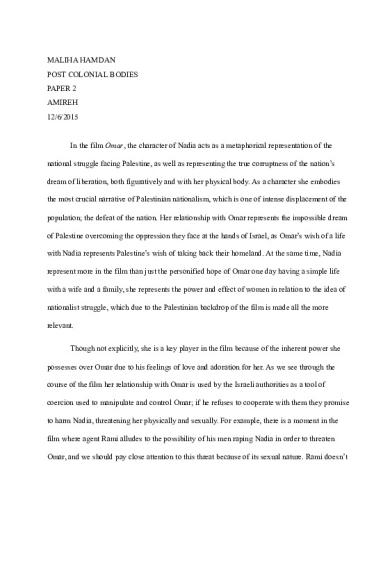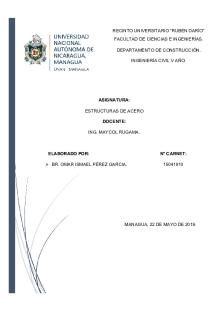Post colonial bodies paper on Palestinian film Omar PDF

| Title | Post colonial bodies paper on Palestinian film Omar |
|---|---|
| Author | Maliha Hamdan |
| Course | Postcolonial Drama |
| Institution | George Mason University |
| Pages | 6 |
| File Size | 103.7 KB |
| File Type | |
| Total Downloads | 77 |
| Total Views | 137 |
Summary
Essay on the film Omar for Post Colonial bodies...
Description
MALIHA HAMDAN POST COLONIAL BODIES PAPER 2 AMIREH 12/6/2015
In the film Omar, the character of Nadia acts as a metaphorical representation of the national struggle facing Palestine, as well as representing the true corruptness of the nation’s dream of liberation, both figuratively and with her physical body. As a character she embodies the most crucial narrative of Palestinian nationalism, which is one of intense displacement of the population; the defeat of the nation. Her relationship with Omar represents the impossible dream of Palestine overcoming the oppression they face at the hands of Israel, as Omar’s wish of a life with Nadia represents Palestine’s wish of taking back their homeland. At the same time, Nadia represent more in the film than just the personified hope of Omar one day having a simple life with a wife and a family, she represents the power and effect of women in relation to the idea of nationalist struggle, which due to the Palestinian backdrop of the film is made all the more relevant. Though not explicitly, she is a key player in the film because of the inherent power she possesses over Omar due to his feelings of love and adoration for her. As we see through the course of the film her relationship with Omar is used by the Israeli authorities as a tool of coercion used to manipulate and control Omar; if he refuses to cooperate with them they promise to harm Nadia, threatening her physically and sexually. For example, there is a moment in the film where agent Rami alludes to the possibility of his men raping Nadia in order to threaten Omar, and we should pay close attention to this threat because of its sexual nature. Rami doesn’t
simply threaten physical harm on Nadia, he threatens rape, which as our readings throughout the semester have shown holds a very large amount of meaning and negativity in the Arab world, more so than other places, as rape causes more shame than any other crime against a woman. During this scene Rami also alludes to knowing unsavory details about Nadia, which creates suspicion of her that sticks with Omar throughout the film, complicating their relationship even further. Going back to the sexual threats made in regards to Nadia, these threats speak to the national narrative of Palestine, because as we have seen women and their sexuality are directly connected to said nation’s narrative. The possible rape of Nadia by Israelis directly correlates to the occupation and take over of the Palestinian’s land by Israel. The potential rape of Nadia also shows the shame and humiliation that Omar would receive by extension, even more broadly, the shame and defeat that the nation of Palestine would feel. By the Israeli enemies raping Nadia, Omar’s masculinity would be compromised, due to the fact that he would have no way to stop it from occurring, no way of protecting his beloved. In regards to culture, masculinity and strength are of the upmost importance in the Arab world, making the threat of sexual violence against Nadia all the more enraging to Omar. Just as the nation of Palestine has no power against the Israeli occupation due to their weakness in comparison to them, Omar is defenseless against Rami’s threats to Nadia, unless he compromises himself and cooperates. This potential rape of Nadia correlates to the rape of the nation of Palestine, to the occupation of this geographical body by the Israeli enemy; the unwelcome intruder. We also see Nadia being presented in a more threatening light in the film by acting as a liability. She is the key factor of Omar’s vulnerability; the reason the enemy is able to manipulate and use him. If she did not exist in the story, the film would most likely be a far less complicated one, as Rami would not have as much leverage over Omar if she were not involved. However, as
she does exist the loyalty of Omar is continuously tested and redefined. Nadia is the sole factor of Omar’s decision making process, the thing that makes him put his entire life on the line and betray the trust of Tarek and Amjad. In other films and works dealing with national narratives, and the oppression and liberation of these places, most notably in a film called Battle of Algiers, there is a very clear physical presence and manifestation of the role of women in regards to the fight against oppressing bodies. The women in the film physically join the battle, placing their physical bodies in the midst of the danger and carry out impactful orders. Putting them on the forefront provides this visual impact to us. However in Omar, Nadia’s influence is more internal as Omar’s emotional ties to her force him into battle. She acts as his Achilles heel- his ultimate vulnerability. Here we see the feminine influence take the helm of the story. Nadia is not allowed a physical role or space within the national struggle, but a simple conversation with Omar where she- for the sake of the argument- perhaps doesn’t make eye contact, could completely shake Omar’s composure-thus resulting in a change in his future course of action. She becomes the ultimate factor in Omar’s decision to betray his friends, and this shows that while she does not occupy a large physical space or role within the film, she is truly the biggest factor in Omar’s decision making process, therefor the best weapon to be used against him. At times we are even made to be suspicious of her as an audience. This is done through camera work, an example being when we as the audience- looking through the lens of Omar’s perspective-see Nadia talking intimately with Ajmad several times, and also in the scene where Rami tells Omar that he knows secrets pertaining to Nadia. Scenes like this are an important example of how Nadia becomes a liability in the film, as she is a liability to the main goal of Omar and his group’s fight against Israeli powers.
Nadia and Omar’s relationship exists in an impossible situation due to the place and time period in which the film takes place, and the debilitating factors of their romance represent the struggles of Palestinian nationalism. With this in mind we can also assign meaning to the placement of the characters in the film, especially Nadia. She lives on the other side of wall, putting a literal barrier between her and Omar, and a dangerous one at that. Omar constantly has to sneak over it, risking injury and death to be with his beloved, the home of his heart. Nadia is to Omar, as Khalifeh puts it in Wild Thorns, “A haven of safety in an occupied land”. This stands as a metaphor for Palestine and its citizens as they literally cannot reside in their own land, and risk their lives every day fighting to remain in it. We can also relate to the film the idea of a brand of nationalism that includes a division of labor based on gender; women having babies, and men bearing arms. The constructions of the national identity are gendered. This idea connects to Omar in that when Omar believes that Nadia is carrying Amjad’s child, he puts aside his desires and wants, and even his frustration over the entire situation to take action in making sure that Nadia and her future child will be safe and secure. This speaks as a metaphor to the Palestinian struggle because there came a point in time in the national narrative when the people found their power in the power of women’s reproduction. The women would bear children, create families and communities, and would win their battle through this peaceful revival of life. However, in an ironic way the film does not depict Nadia’s supposed pregnancy as a sign of liberation, but instead the ultimate and final wall between Omar and Nadia’s relationship. Her pregnancy instead stands as a symbol of the unwinnable dream for Palestinian liberation. She carries a future hope, but not with Omar. The safety of Nadia’s unborn child become Omar’s sole task, and yet he must remove himself from a potential future with Nadia. Nadia goes from being a dream of Omar’s future, to then being a liability, to finally becoming an unachievable goal.
Nadia represents the dream of Palestinian liberation, but the impossible side of this dream. Omar desperately wants to be with Nadia, to have a simple life with her without complications. But as the film plays out we see that it is impossible, especially when Omar believes that she is pregnant with Amjad’s child. Suddenly, everything that he has been fighting for during the course of the film becomes irrelevant, and Nadia becomes an impossibility, an unbreachable wall, much like the current situation faced by Palestinians in regards to their homeland. The film does a wonderful job of symbolically showing this, as in one of the last scenes of the film Omar attempts to climb the wall after more than three years after the climax of the film. Try as he may, he struggles to get over it, to return back to his homeland in Nadia. This scene holds, in my opinion the most power and impact within the film as it encapsulates the national narrative, the ongoing struggle of the Palestinian people to exists in their former home.
Works Consulted Amireh, A. Between Complicity and Subversion: Body Politics in Palestinian National Narrative. Youth Atlantic Quarterly 102.4 (2003) 747-772...
Similar Free PDFs

Film Review Paper
- 5 Pages

Extra Credit Film Paper
- 4 Pages

Film reflection paper guidelines
- 1 Pages

speech Outline on film
- 1 Pages

SET 9 - Omar Eldakar
- 9 Pages

Israeli-Palestinian Conflict
- 2 Pages

Omar Perez Garcia
- 6 Pages

SET 2 - Omar Eldakar
- 5 Pages
Popular Institutions
- Tinajero National High School - Annex
- Politeknik Caltex Riau
- Yokohama City University
- SGT University
- University of Al-Qadisiyah
- Divine Word College of Vigan
- Techniek College Rotterdam
- Universidade de Santiago
- Universiti Teknologi MARA Cawangan Johor Kampus Pasir Gudang
- Poltekkes Kemenkes Yogyakarta
- Baguio City National High School
- Colegio san marcos
- preparatoria uno
- Centro de Bachillerato Tecnológico Industrial y de Servicios No. 107
- Dalian Maritime University
- Quang Trung Secondary School
- Colegio Tecnológico en Informática
- Corporación Regional de Educación Superior
- Grupo CEDVA
- Dar Al Uloom University
- Centro de Estudios Preuniversitarios de la Universidad Nacional de Ingeniería
- 上智大学
- Aakash International School, Nuna Majara
- San Felipe Neri Catholic School
- Kang Chiao International School - New Taipei City
- Misamis Occidental National High School
- Institución Educativa Escuela Normal Juan Ladrilleros
- Kolehiyo ng Pantukan
- Batanes State College
- Instituto Continental
- Sekolah Menengah Kejuruan Kesehatan Kaltara (Tarakan)
- Colegio de La Inmaculada Concepcion - Cebu







